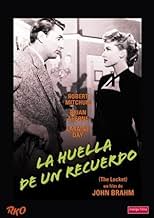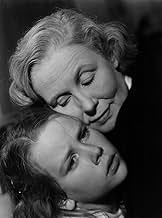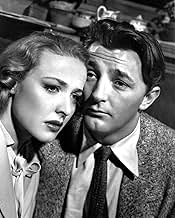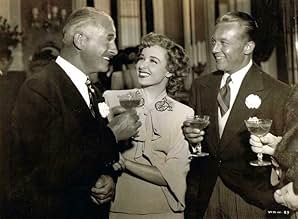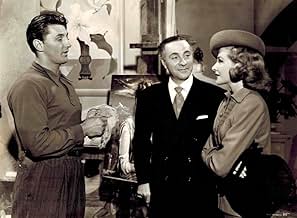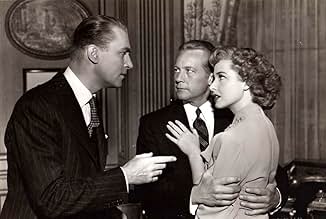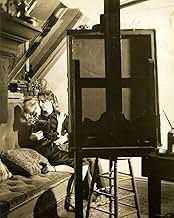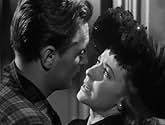IMDb-BEWERTUNG
7,1/10
3420
IHRE BEWERTUNG
Füge eine Handlung in deiner Sprache hinzuJust before his wedding, the bridegroom hears a complex tale painting his lovely bride as devilish and unbalanced.Just before his wedding, the bridegroom hears a complex tale painting his lovely bride as devilish and unbalanced.Just before his wedding, the bridegroom hears a complex tale painting his lovely bride as devilish and unbalanced.
- Regie
- Drehbuch
- Hauptbesetzung
- Auszeichnungen
- 4 wins total
Helene Thimig
- Mrs. Monks
- (as Helen Thimig)
Mari Aldon
- Mary
- (Nicht genannt)
Polly Bailey
- The Cook
- (Nicht genannt)
Empfohlene Bewertungen
The Locket (1946)
Well, when you have a post-war movie with Robert Mitchum at his young prime, you can't go wrong.
The star (or starlet, as they used to say) is actress Laraine Day playing Nancy, and she pulls off a charming, attentive, smart perfect woman. A bride to be, in fact. The movie starts with people arrive to a high class wedding. Mitchum shows up via flashback (classic film noir stuff). In fact, there is a flashback within a flashback within a flashback (4 levels) and it's sort of fun.
There are some great lines like, "If you'e lucky you can afford to be nice." But some of the dialog, and maybe the plot overall, is a hair stiff at times.
Director John Brahm is not well known, but his "Hangover Square" the year before is really great. And this one shows a consistent sense of storytelling and drama with highs and lows if not always fully developed characters. The key character is Nancy, who uses her charm to win over the audience as well as the men around her in the plot. Day plays her role perfectly—swiveling sweetness against a just perceptible insincerity. She's a terrific liar.
Which brings me back to Mitchum, who is good but seems to be reading rehearsed lines too often. I think there was supposed to be chemistry between Day and Mitchum, but it wasn't there, even though they both look terribly good.
Though it has a noir-like flavor, this strikes me as a straight up melodrama overall, and with soaring music and lots of dramatic lighting there is no way to not get absorbed in it. There are some short but well done scenes of London during the war (bombs and blackouts).
A well done and lesser known good one. And a fun curiosity—the crazed music box music that denotes an uneven state of mind is the same as that used in the "Bad Seed."
Well, when you have a post-war movie with Robert Mitchum at his young prime, you can't go wrong.
The star (or starlet, as they used to say) is actress Laraine Day playing Nancy, and she pulls off a charming, attentive, smart perfect woman. A bride to be, in fact. The movie starts with people arrive to a high class wedding. Mitchum shows up via flashback (classic film noir stuff). In fact, there is a flashback within a flashback within a flashback (4 levels) and it's sort of fun.
There are some great lines like, "If you'e lucky you can afford to be nice." But some of the dialog, and maybe the plot overall, is a hair stiff at times.
Director John Brahm is not well known, but his "Hangover Square" the year before is really great. And this one shows a consistent sense of storytelling and drama with highs and lows if not always fully developed characters. The key character is Nancy, who uses her charm to win over the audience as well as the men around her in the plot. Day plays her role perfectly—swiveling sweetness against a just perceptible insincerity. She's a terrific liar.
Which brings me back to Mitchum, who is good but seems to be reading rehearsed lines too often. I think there was supposed to be chemistry between Day and Mitchum, but it wasn't there, even though they both look terribly good.
Though it has a noir-like flavor, this strikes me as a straight up melodrama overall, and with soaring music and lots of dramatic lighting there is no way to not get absorbed in it. There are some short but well done scenes of London during the war (bombs and blackouts).
A well done and lesser known good one. And a fun curiosity—the crazed music box music that denotes an uneven state of mind is the same as that used in the "Bad Seed."
Brahm's intricately constructed film is based on the obvious conceit of a locket: in psychoanalytical terms, it symbolises repressed memory and of the 'opening up' of hidden psychosis. In a filmic sense of course, The Locket itself is a cinematic 'locket', the flashbacks within flashback structure reflecting the secret enclosure typical of such a piece of jewellery.
In fact I can't think of another film that takes this much commented narrative technique to such extremes. Mitchum of course was well used to playing heros faced with abnormal feminine psychology. He faces similar femme fatales in Preminger's 'Angel Face' for instance and in Farrow's 'Where Danger Lives' - all made at around the same time (end 40's, start of 50's). This may reflect something of the obsession that Hollywood had with cod Freudianism just as much as noir convention, but there is no doubting that Mitchum's peculiar manner as an actor, his doe-eyed sleep-walking acting style, made his starring excursions into the dangers of the subconscious peculiarly effective.
Brahm, one of Hollywoods most neglected directors at least for the work that he did at this time in his career, makes the somewhat over- stretched structure of the film work, pun intended, like a dream. Nancy's final walk to the altar, immediately before her mental and psychic collapse, although necessarily melodramatic, is very effective version of a personal calvary and she seems stunned and trance like. In retrospect, of course, it is easy to see how the whole of the preceding film has been leading up to this sequence, (just as how the flashback structure of the film reminds one in passing of 'Citizen Kane') but the sound and vision montage is still powerful.
By setting the bulk of the film in flashback, Brahm places it in the past - or, more precisely, in the imaginatively reconstructed past, and it is this dream-sense that retains a powerful grip on the viewer as events unfold. This almost hallucinatory sense, together with a feeling of 'drifting with fate', marks out some of the greatest noirs and B-mysteries made at this time and is what makes this film still very watchable today.
A 'Locket' well worth looking into.
In fact I can't think of another film that takes this much commented narrative technique to such extremes. Mitchum of course was well used to playing heros faced with abnormal feminine psychology. He faces similar femme fatales in Preminger's 'Angel Face' for instance and in Farrow's 'Where Danger Lives' - all made at around the same time (end 40's, start of 50's). This may reflect something of the obsession that Hollywood had with cod Freudianism just as much as noir convention, but there is no doubting that Mitchum's peculiar manner as an actor, his doe-eyed sleep-walking acting style, made his starring excursions into the dangers of the subconscious peculiarly effective.
Brahm, one of Hollywoods most neglected directors at least for the work that he did at this time in his career, makes the somewhat over- stretched structure of the film work, pun intended, like a dream. Nancy's final walk to the altar, immediately before her mental and psychic collapse, although necessarily melodramatic, is very effective version of a personal calvary and she seems stunned and trance like. In retrospect, of course, it is easy to see how the whole of the preceding film has been leading up to this sequence, (just as how the flashback structure of the film reminds one in passing of 'Citizen Kane') but the sound and vision montage is still powerful.
By setting the bulk of the film in flashback, Brahm places it in the past - or, more precisely, in the imaginatively reconstructed past, and it is this dream-sense that retains a powerful grip on the viewer as events unfold. This almost hallucinatory sense, together with a feeling of 'drifting with fate', marks out some of the greatest noirs and B-mysteries made at this time and is what makes this film still very watchable today.
A 'Locket' well worth looking into.
This film by underrated director John Brahm is one of the more interesting works of the 1940s (not one of the best, but different).
Laraine Day plays Nancy, about to marry and hiding some dark secrets in her past. She was excellent at this kind of thing. Gene Raymond (not the most charismatic of actors but surprisingly good here) plays her intended, with Brian Aherne as the psychiatrist who knows about her previous life.
In flashback we see Nancy and her husband (a young Robert Mitchum) and then into another flashback (daring to attempt this at the time when many films were still pursuing conventional structure).
'The Locket' of the title obviously holds the key to the mystery, and we have an absorbing time pulling all the loose ends together. Reginald Denny, Ricardo Cortez, and Ellen Corby decorate an accomplished cast.
Laraine Day plays Nancy, about to marry and hiding some dark secrets in her past. She was excellent at this kind of thing. Gene Raymond (not the most charismatic of actors but surprisingly good here) plays her intended, with Brian Aherne as the psychiatrist who knows about her previous life.
In flashback we see Nancy and her husband (a young Robert Mitchum) and then into another flashback (daring to attempt this at the time when many films were still pursuing conventional structure).
'The Locket' of the title obviously holds the key to the mystery, and we have an absorbing time pulling all the loose ends together. Reginald Denny, Ricardo Cortez, and Ellen Corby decorate an accomplished cast.
I'm correcting a mistake in the previous post by Limsgirl of Massachussetts. That was NOT the mother of Olivia de Havilland and Joan Fontaine who played the cruel woman who gives Nancy (Laraine Day) the locket. That woman was actress KATHERINE EMERY who played many "evil" or mean women in supporting roles. Lilian Fontaine had a brief nondescript role as a wealthy woman and made no impression whatsoever--she never had a really good role on screen, appearing briefly in THE LOST WEEKEND (Jane Wyman's mother) and IVY (as Joan Fontaine's friend, Lady Flora). LET'S GIVE CREDIT WHERE IT'S DUE--and applause for Katherine Emery as the cruel woman who has an immense effect on Nancy's life.
Having recently watched John Brahms' two preceding movies, both centring on psychologically disturbed men (killers in fact) in period features, here the director presents us with an emotionally unstable woman in a contemporary setting. I enjoyed the two earlier films "The Lodger" and "Hangover Square" and I enjoyed this one too.
The lead character is played by Laraine Day, whose beauty attracts men like honey to a bee, although little do they know that she is a closet kleptomaniac with slippery fingers around rich folk's jewellery, her condition traceable to a childhood incident when she covets an expensive locket given to her by the rich little girl whose house her mother serves, but taken back away from her by the girl's mother as too good for her. When the locket later goes missing she is menacingly if mistakenly accused by the mother and given to believe that her shame at this has coloured her future conduct as an adult. Not only do her good looks attract the interest of deep men like Robert Mitchum's artist and Brian Aherne's doctor, it all climaxes in a super-charged betrothal scene to her third beau, the very rich Gene Raymond whose mother's nuptial gift to her of a locket finally unlocks years of denial and guilt on her part.
I'd have to say that the plot certainly overdoes the Freudian associations of Day's Cassandra-like obsession with jewellery. I also couldn't quite imagine Mitchum firstly as a tortured artist and secondly taking the extreme action he does as he gives up Day to Aherne, while the final coincidence of the other locket was just a bit too much to swallow.
Nevertheless, it was again stylishly directed by Brahm with strong performances by Day as the beguiling magpie Nancy, as adept at stealing men's hearts as old folk's jewellery, Aherne as the duped doctor and even Mitchum, miscast as he was. The layered flashbacks I found intriguing while the use of dramatic lighting, staging and music added greatly to the suspense.
1940's Hollywood movies were awash with psychologically disturbed individuals in films from Citizen Kane on down and while this particular feature overdoes the angst more than a bit, it was none the less entertaining for all that.
The lead character is played by Laraine Day, whose beauty attracts men like honey to a bee, although little do they know that she is a closet kleptomaniac with slippery fingers around rich folk's jewellery, her condition traceable to a childhood incident when she covets an expensive locket given to her by the rich little girl whose house her mother serves, but taken back away from her by the girl's mother as too good for her. When the locket later goes missing she is menacingly if mistakenly accused by the mother and given to believe that her shame at this has coloured her future conduct as an adult. Not only do her good looks attract the interest of deep men like Robert Mitchum's artist and Brian Aherne's doctor, it all climaxes in a super-charged betrothal scene to her third beau, the very rich Gene Raymond whose mother's nuptial gift to her of a locket finally unlocks years of denial and guilt on her part.
I'd have to say that the plot certainly overdoes the Freudian associations of Day's Cassandra-like obsession with jewellery. I also couldn't quite imagine Mitchum firstly as a tortured artist and secondly taking the extreme action he does as he gives up Day to Aherne, while the final coincidence of the other locket was just a bit too much to swallow.
Nevertheless, it was again stylishly directed by Brahm with strong performances by Day as the beguiling magpie Nancy, as adept at stealing men's hearts as old folk's jewellery, Aherne as the duped doctor and even Mitchum, miscast as he was. The layered flashbacks I found intriguing while the use of dramatic lighting, staging and music added greatly to the suspense.
1940's Hollywood movies were awash with psychologically disturbed individuals in films from Citizen Kane on down and while this particular feature overdoes the angst more than a bit, it was none the less entertaining for all that.
Wusstest du schon
- WissenswertesNorma Barzman's lengthy treatment for this film, which Sheridan Gibney revised into a screenplay, was inspired by a true event which was recounted to her by financier George Peabody Gardner and his sister Belle. When younger, the Gardners eschewed their aristocratic upbringing partly in reaction to an incident in their youth: As children they became friendly with the daughter of the family's housekeeper. It transpired that the daughter was wrongly accused of stealing a locket, leading to the firing and departure of the housekeeper and her daughter. Years later, they learned that the daughter suffered from depression and was implicated in a theft, a consequence for which the Gardners felt their family was partly responsible.
- PatzerAmerican ambulances, shown driven with left-hand drive, were not used in wartime London.
- Zitate
Norman Clyde: I don't take money for nothing. I'm not conducting a class so the parasitic rich can escape boredom. I'm not that hard up.
Nancy Patton: Well, I hope you never will be, Mr. Clyde. I admire your principles. I wish I could say the same for your disposition.
- VerbindungenEdited into Geschichte(n) des Kinos: Fatale beauté (1994)
Top-Auswahl
Melde dich zum Bewerten an und greife auf die Watchlist für personalisierte Empfehlungen zu.
Details
- Erscheinungsdatum
- Herkunftsland
- Sprache
- Auch bekannt als
- What Nancy Wanted
- Drehorte
- Produktionsfirma
- Weitere beteiligte Unternehmen bei IMDbPro anzeigen
- Laufzeit1 Stunde 25 Minuten
- Farbe
- Seitenverhältnis
- 1.33 : 1
Zu dieser Seite beitragen
Bearbeitung vorschlagen oder fehlenden Inhalt hinzufügen


